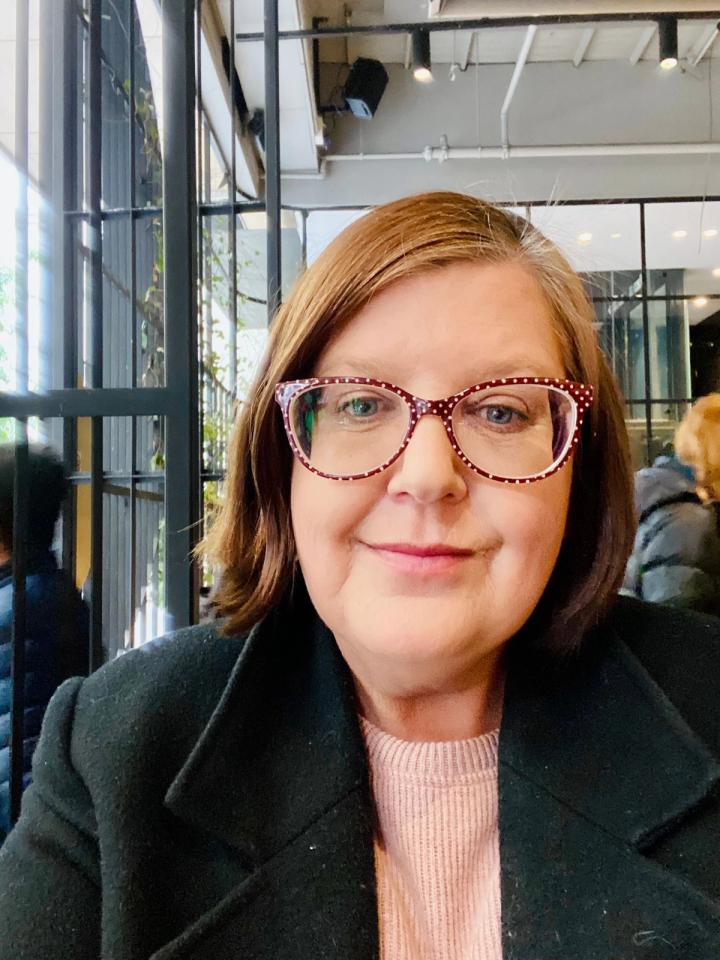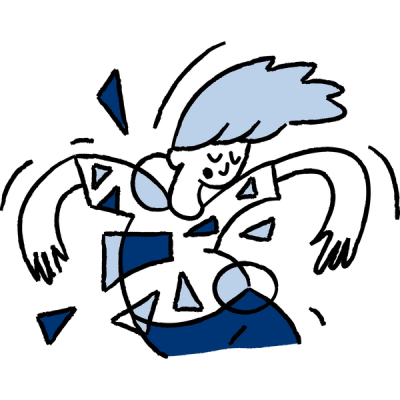Cristina’s journey with Lifeline began in an unexpected moment—sitting in an Emergency Department, exhausted and overwhelmed while caring for a loved one.
Frustrated and unsure where to turn, she made a call that changed everything. A compassionate Lifeline Crisis Supporter listened, offering empathy and understanding through the night. That call stayed with Cristina, reinforcing the power of connection and support.
Today, she is a passionate lived experience advocate, working to break the stigma around psychosis and mental illness. She’s here to share her story and remind us that no one has to go through their darkest moments alone.
Read the transcript:
Narrator:
[00:00:00] Welcome to Holding on to Hope, a series that shares the stories of everyday Australians that have experienced moments in crisis and found a path to support.
[00:00:09] Whilst all of the stories shared offer hope and inspiration, at times you may hear something you find triggering.
[00:00:15] If you or someone you know needs crisis support, please phone Lifeline on 13 11 14, text 0477 13 11 14 or visit lifeline.org.au for Lifeline chat service, which is 24/7.
Carla (host):
[00:00:31] Christina's journey with Lifeline began in an unexpected moment, sitting in an emergency department, exhausted and overwhelmed while caring for her daughter. Frustrated and unsure where to turn, she made a call that changed everything. A compassionate Lifeline crisis supporter listened, offering empathy and understanding through the night. That call stayed with Christina, reinforcing the power of connection and support. Today, she is a passionate lived experience advocate, working to break the stigma around psychosis and mental illness.
[00:01:01] She's here to share her story and remind us that no one has to go through their darkest moments alone. So can you take us back to that night in the emergency department? What was going through your mind and what made you reach out to Lifeline?
Christina:
[00:01:20] I was really feeling defeated. I was just tired and exhausted and angry and sad, trapped because like I had to stay there. I couldn't like leave because I was caring for my loved one to make sure they got treatment.
[00:01:39] But yeah, I was just dreading that when they did get sane, they were just going to get turned away again like so many other times and then we'd just be back and forward.
[00:01:53] And, you know, we'd go home late and then we'd had to rush back to the ED. I hadn't really charged my phone and yeah, my phone had run out of battery.
[00:02:03] And I just, there was no one talked to just alone watching people. And so I just thought,
[00:02:12] why not find Lifeline? There's a public phone and it was 3am. And, you know, you don't want to find your loved ones and your family and people at 3am and wake them up, you know, just just because you're having a bad night. So I thought... they're there.
Carla (host):
[00:02:31] You've painted such a fantastic picture of what it's like to be in the emergency department. Lots of people have had that experience.
[00:02:39] Can you just say a little bit more about what was going on for your loved one? Why were you in the emergency department?
Christina:
[00:02:46] They were having mental health struggles. They'd had psychosis in and out a few times. We just weren't getting the help we needed.
[00:02:58] We'd just get turned away. You'd get seen and yeah, get told to go home and watch TV, take your mind off it. Someone else would find you the next day.
[00:03:11] You know, when your loved one needs more than you, when they need actual real help. And yeah, I just couldn't get it.
Carla (host):
[00:03:20] Those feelings of exhaustion and frustration as a carer, how did those emotions build up for you over time?
Christina:
[00:03:28] For me personally, I was trying to live just a normal, just living a normal life while dealing with a mental health crisis at the same time.
[00:03:42] So getting up and going to work and trying to give 100% at work while you're getting phone calls and things are going on in your life, which you're trying to block out and ignore,
[00:03:54] and then just going home to having to be a carer and doing appointments and then ED visits and feeling like you're get nowhere, and just going over and over again for weeks and months without really getting any solutions. You just get exhausted from trying, trying to find help.
Carla (host):
[00:04:13] I'm sure other people can hear your experience and go, yeah, I've, I've, I've felt the same and it's going around in circles, trying to get some help.
Christina:
[00:04:31] Yeah, I felt like I was just about to snap before I found Lifeline. I just, yeah, I was just so angry. I really felt like I was going to snap. And it was someone that could just sort of put out the fuse.
Carla (host):
[00:04:46] So Christina, you, you were in the emergency department and you, you made that call to Lifeline, but there must've been a period before that where you were giving so much to your loved one.
[00:04:58] What was happening for your mental health and were you thinking about supporting yourself during that time?
Christina:
[00:05:06] No, I wasn't thinking about supporting myself at all through that time. My own mental health was really, really down. The lowest it had ever been.
[00:05:18] I never felt so bad. I just felt like as a mother, I was a complete failure. I couldn't get the help for my child.
[00:05:29] No matter what I did, no matter who I find, who I call, no matter what I did, I just couldn't do it. And I just, I was just so depressed.
[00:05:40] I think by that point, I was anxious because I never knew what was going to happen next, where things were going to take us, what turn of events were going to happen, who was going to knock at the door, bang on the window at the night, just to see if we're okay.
[00:05:59] Or I just, I'd never been so bad. Just really down.
Carla (host):
[00:06:05] And with your energy focused on looking after your loved one, it sounds like it left little space or energy to think about your health.
Christina:
[00:06:16] No, and I didn't even want to think about it. If anyone asked, I was just like, no, all I need is my daughter fix. Like, don't worry about me. Just fix my, you know, my loved one. Just fix my loved one. Don't worry about me.
Carla (host):
[00:06:31] And it sounds like it came at that 3am phone call that you couldn't ignore that any longer, that you really needed something for you.
Christina:
[00:06:41] Yep, that's right. One day, I was on the train. I was traveling down to Warrnambool to see my sister and my niece and her little boy. And I put on one of my favorite podcasts. It's called 'Three Mums in the Trenches'.
[00:06:56] It's about three mums with children with schizophrenia. And they had a lady speaking about ambiguous loss and grief. And as I listened, I realized that that's what I was feeling. That's what I had. I had ambiguous loss.
[00:07:14] I feel like my loved one was still there, but I'd lost a part of them. I'd lost, yeah, I'd lost what I thought was going to happen in normal adult life. When you see your children grow up and, you know, get a job and go to work and get married and, you know, be normal adults.
[00:07:37] I'd lost that in a way because my loved one's illness was, yeah, quite serious. They were in their hospital. They weren't able to have a job or relationships and things like that.
Carla (host):
[00:07:54] Ambiguous loss. That's a really interesting topic and concept to think through. Can you give us a little bit more so that other people might connect?
Christina:
[00:08:03] It's uncertain. There's a loss, but the loss is unclear. In caregiving, you know, you're dealing with, you're looking after a loved one, but you don't know. There's uncertainty in the future.
[00:08:19] It explained it. I was feeling a loss, but I couldn't really, I didn't want to call it a grief. It was grief and I was lost, but I still had my loved one. They were still there present.
[00:08:32] But part of them had gone. Part of their personality had changed and I could see as the years went on that it was different. The relationship had changed and you had to change with it.
Carla (host):
[00:08:55] It also sounded like you were thinking about what your loved one might not get to do in their life.
Christina:
[00:09:04] Yeah, absolutely. Already they've missed out on so much. Like they had their first psychotic episode when they were 18, 18, 19, and now they're 28.
[00:09:17] You do grieve for, you grieve for the life they've got, what you thought they'd have.
Carla (host):
[00:09:25] You rang Lifeline at three o'clock in the morning during that hard night in emergency. What was it about the conversation with the Lifeline crisis supporter that made an impact on you?
Christina:
[00:09:36] I just felt like I had someone on my side for once. It wasn't just a family member just agreeing with you because your family or friends.
[00:09:46] It was a total stranger and I'd laid it all out on the table, how hard we were trying and all the things we'd done.
[00:09:53] They validated, they said, yeah, you're doing a really hard job. You're doing a really great job. And I don't think I could do any more than what you're doing. It made me feel like I can keep going.
Narrator:
[00:10:08] We hope you're enjoying this episode. Lifeline's new Support Toolkit makes it easier to care for family, friends, and loved ones, and look after yourself along the way.
[00:10:20] Visit us at toolkit.lifeline.org.au. Now, back to the episode.
Carla (host):
[00:10:27] That phone call in the middle of the night, what helped you get through the rest of that night and what changed for you after that?
Christina:
[00:10:34] It made me realise that the more I reached out, the more likely I was, even though not all the time, but the more likely you are to reach out, there are people that will be on your side and will understand you and will support you.
Carla (host):
[00:10:51] What kind of resources do you have now or strategies to check in on yourself to manage your health, your mental health?
Christina:
[00:11:00] I found that art works for me. I like to be creative and I feel like if I can get it out, it's through writing, through performing.
[00:11:11] I've done some stand-up comedy where I can sort of take a satirical look at life and make fun of things.
[00:11:21] Being able to laugh, being able to be creative, get it out of your mind and onto something, a piece of paper, pen, spoken.
[00:11:34] I've also started writing some books. I've really learnt that you have to hold two ideas.
[00:11:43] If you can hold two ideas in either hand of conflicting ideas and be okay with both of them... That's what you have to be able to do.
Carla (host):
[00:11:56] Writing your own books, stand-up comedy, what can't you do?
Christina:
[00:12:01] Yeah, I look after myself. I have empathy for myself now. In the last 12 months, I've been to Brisbane, Adelaide, Canberra for the first time.
[00:12:13] I went on the overland train to Adelaide. I'm just like, you deserve this. You've done a really hard job.
[00:12:23] And when my loved one's well and they're okay, I do things.
Carla (host):
[00:12:28] So that reaching out, that connection, you've mentioned that as a key part of working on and maintaining your emotional health.
[00:12:38] What does that look like in your life today?
Christina:
[00:12:41] It's about finding the right people for you who make you feel good and make you feel happy.
[00:12:48] I go to work. I'm lucky enough to work in a school.
[00:12:51] So I'm surrounded by wonderful young people and you can smile and say hello to them.
[00:12:57] And, you know, the daily interactions are just wonderful.
[00:13:03] Most days I go across the road. We have a lovely cafe here called Dial-a-Lunch, Dial.
[00:13:10] And it's all staffed by young disabled adults.
[00:13:14] And they're lovely. And I go and I have my lunch and they say, 'oh, we bring you your delicious lunch'.
[00:13:20] Or 'it's your favorite meal'. And they all know me. And all the girls that work with me, you know, they're kind of my people.
[00:13:29] And yeah, I just got involved with more people in the art sector, in the lived experience sector, and just met so many people.
[00:13:41] My life's changed so much since that phone call.
Carla (host):
[00:13:44] So you mentioned there the lived experience advocacy work that you do.
[00:13:49] What led you to become part of that? And why is it important for you?
Christina:
[00:13:54] When I was struggling with trying to find help over many years, many years for my loved one.
[00:14:01] It took many years to get help. I was worried.
[00:14:05] We had ambulance, police coming, all times, multiple times during the week.
[00:14:11] I was worried about the ambulance not being at the right people.
[00:14:15] People, you know, people having medical episodes and they were here. It was a whole drain on the community services.
[00:14:21] So I would email and I would write letters every night because that was all I could do.
[00:14:27] The mental health minister at the time, he emailed me back and he suggested I get involved with Tandem and changing the mental health sector.
[00:14:39] And the Royal Commission had just come out in Victoria and all the findings that it wasn't fit for purpose.
[00:14:49] And yeah, I wanted to be involved in the changes. I wanted to help make it better.
Carla (host):
[00:14:55] That's such a gift you've given of your expertise and experience to help reshape those institutions.
[00:15:03] One of the things that still needs a bit of work is stigma around mental illness and psychosis.
[00:15:10] How do you think we can change that conversation?
Christina:
[00:15:14] I think people need to listen to more people that have experienced psychosis.
[00:15:20] Before the Lifeline call, I'd known a handful of people in my life with psychosis, including my ex-fiancé who suffered from psychotic episodes.
[00:15:36] And I've known other people.
[00:15:39] But before that, I didn't have a lot of idea.
[00:15:43] So, yeah, I think definitely we just need to listen to people that have had psychosis because it can basically happen to anyone.
[00:15:52] It happens to a lot of young people.
[00:15:54] They're brilliant.
[00:15:55] They're in university and the stress can just be too much.
[00:16:00] And they can have their first psychotic episode.
[00:16:03] It can be the lovely lady down the street that has her first baby and has a psychotic episode who goes into postnatal psychosis.
[00:16:14] They're not bad people.
[00:16:17] They're just everyday normal people.
[00:16:21] I work with Australia Early Psychosis, the collaborative consortium, and we have a lived experience network.
[00:16:32] We have an Instagram page called Psychosis Understood.
[00:16:36] Good to plug that.
[00:16:38] Well done.
[00:16:39] Yeah, Psychosis Understood.
[00:16:40] And we have lots of content from all sorts of people.
[00:16:45] Yeah, lots of real facts on psychosis.
Carla (host):
[00:16:48] I wondered what you might say or what advice you'd have for other carers who might find themselves in that exhausted, defeated, overwhelmed position that you were in.
Christina:
[00:17:00] To be kind to themselves, to have radical empathy for themselves and to use it to find carer services, find all the services you can and use whatever you can.
[00:17:18] Just keep searching.
[00:17:19] Particularly, I use Carers Victoria.
[00:17:24] Once a year they have a mingle.
[00:17:26] We all get together.
[00:17:27] I'm with Barwon Health Carers.
[00:17:30] I'm with Tandem Carers.
[00:17:32] There's a mental health carer support fund in Victoria, which allows us to have $1,000 a year to use towards respite.
[00:17:42] Don't be so hard on yourself.
[00:17:45] You know, you're doing the best you can.
Carla (host):
[00:17:46] If we were going to leave a message with listeners who might be struggling right now, what would you say to them?
Christina:
[00:17:55] I'd say be kind to yourself and just pick up the phone if you need someone to talk to and give Lifeline a ring.
Carla (host):
[00:18:05] Christina, it's been so good to talk to you today.
[00:18:08] I'm really going to take away this message of radical empathy for yourself in times of stress.
[00:18:14] It's been terrific to hear your experience, your story, and I'm sure there'll be many people who connect with you and your story.
Narrator:
[00:18:23] Thanks for listening to Holding On To Hope, the podcast.
[00:18:28] Lifeline is grateful to all Holding On To Hope participants for choosing to share their personal lived experiences openly and courageously in order to offer hope and inspiration to others.
[00:18:39] Your act of kindness makes for a better world.
[00:18:41] And remember, you can call Lifeline at any time on 13 11 14.




